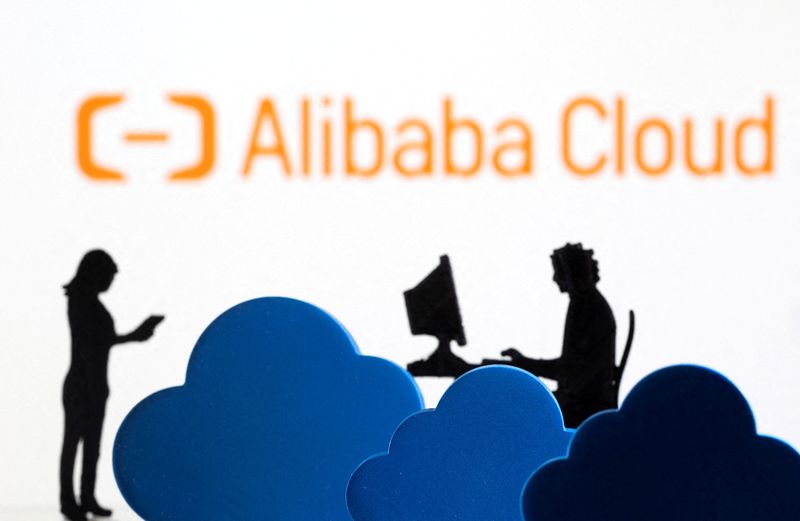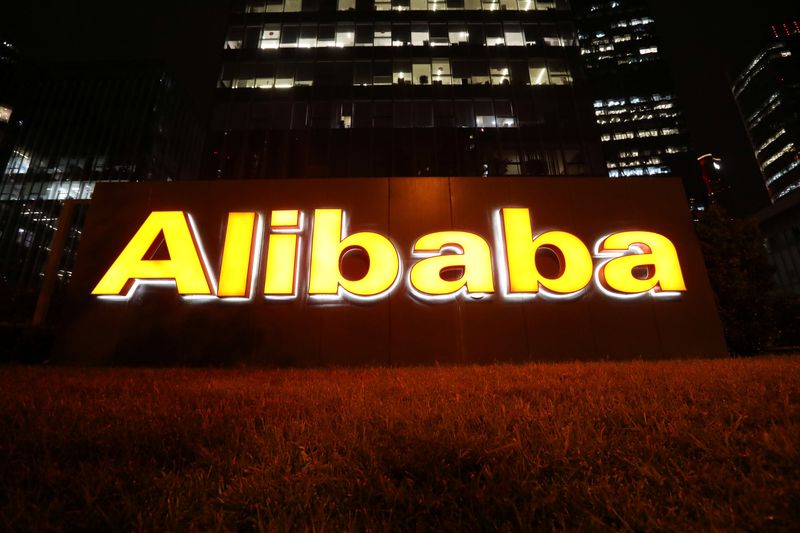By Casey Hall and Akash Sriram
(Reuters) -Alibaba Group has scrapped plans to spin-off its cloud business, citing uncertainties created by U.S. export curbs on chips used in artificial intelligence applications.
The U.S. decision last month to ban the export to China of more chips used in artificial intelligence (AI) has created major uncertainties for the country's big tech companies.
Tencent Holdings (OTC:TCEHY) said on Wednesday it saw the curbs impacting its cloud services.
Thursday's announcement came alongside in-line second-quarter revenue from the Chinese e-commerce group, which in March had unveiled plans to carve out the cloud business as part of the biggest restructuring in its 24-year history.
The company also put on hold plans for an initial public offering of its Freshippo groceries business but said it would prepare external fundraising for its international digital commerce group arm.
Alibaba (NYSE:BABA)'s logistics division, Cainiao applied to list in Hong Kong in September.
Alibaba's U.S.-listed shares were down 8.5% at market open.
"The market does not like surprises," Thomas Hayes, chairman at hedge fund Great Hill Capital said on the X social media platform.
"Investors had hoped to receive separate shares of the cloud business in hopes the segment could achieve a higher multiple in the public markets due to its growth potential."
Analysts had in March estimated the cloud division could be worth between $41-60 billion but had warned that its listing could attract scrutiny from both Chinese and overseas regulators due to the reams of data it manages.
In September, Alibaba's former group CEO Daniel Zhang abruptly quit just two months after concentrating his focus on cloud computing.
The company then appointed Eddie Wu, one of Alibaba Group's co-founders and long-time lieutenant of former chief Jack Ma, as both CEO of Alibaba and the cloud business. Zhang also handed the group chairmanship to another co-founder, Joseph Tsai.
"Alibaba will not pursue a full spin-off of Cloud Intelligence Group in light of uncertainties created by recent U.S. export restrictions on advanced computing chips," Tsai told analysts on a post-earnings call.
Instead the group would focus on growing the cloud business and providing investment for its AI drivers, he said.
The cloud unit will continue to maintain its independent operation, Wu added.
Regulatory filings also revealed on Thursday that Ma's family trust plans to sell 10 million American Depository Shares of Alibaba Group Holdings for about $871 million.
DEVELOPMENT STRATEGY
Wu, presenting Alibaba's earnings for the first time on the call, also detailed its future strategy, saying that each of its businesses would face the market more independently and that they would conduct a strategic review to distinguish between "core" and "non-core" businesses.
"Core businesses are where we will keep our long-term focus, intensively invest resources, pursue R&D, enhance user experience," he said. The Alibaba restructuring broke it up into six units, managed by the group as a holding firm.
"As for the non-core businesses, we will realise the value of these assets by turning them profitable as soon as possible or through other means of capitalisation."
They will also invest in and incubate innovative businesses for the future, he added, naming four units, including work communication and collaboration platform DingTalk and second-hand goods platform Xianyu as ones that will be allowed to operate as independent subsidiaries.
In September, he told staff that the tech giant's two main strategic focuses going forward will be "user first" and "AI-driven".
EARNINGS IN LINE
Alibaba reported second-quarter revenue of 224.79 billion yuan ($31.01 billion), in line with the 224.32 billion expected by analysts, LSEG data showed.
China's economic recovery has been uneven. While the industrial and the retail sectors have performed better than expected, the crisis-hit property sector has weighed on consumer confidence.
Customer management revenue from Alibaba's commerce retail, which tracks how much money merchants provide Alibaba for placements and promotions, grew 3% year-on-year. Alibaba asked merchants to price aggressively during the country's Singles Day festival taking on competitors such as Douyin and PDD Holdings' Pinduoduo (NASDAQ:PDD) which have been selling lower-cost products year-round.

Alibaba International Digital Commerce, a business that includes platforms such as Lazada and AliExpress, however reported a 53% rise in revenues, with retail revenue up 73% year-on-year. Analysts had predicted that strong international growth might help Alibaba offset a tepid domestic market. The cross-border platform environment has become more intensely competitive with the emergence of PDD Holdings-owned Temu.
($1 = 7.2481 Chinese yuan renminbi)
